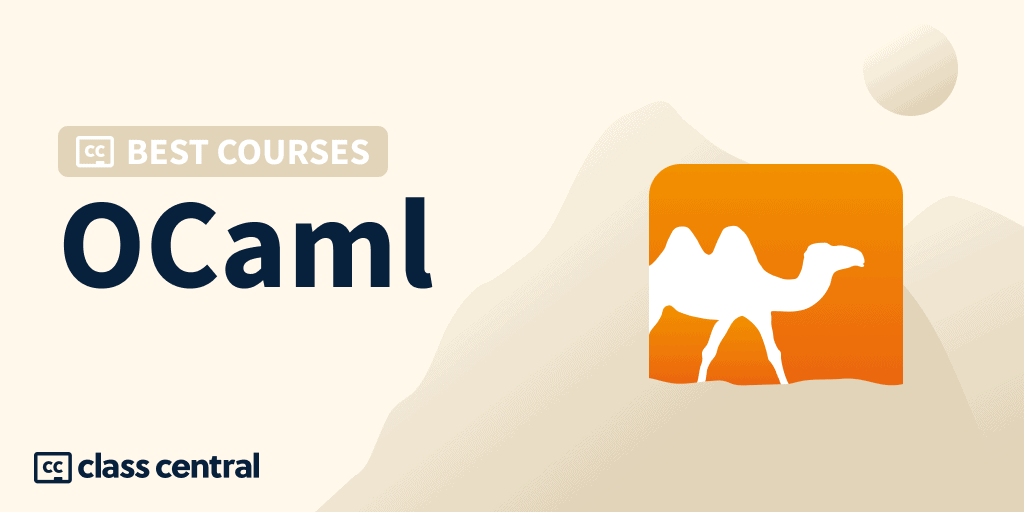7 Best Free OCaml Courses for 2025
Here are the best free online courses to learn OCaml, a general-purpose, statically-typed programming language that is widely used in academia and research institutions.

OCaml is a multi-paradigm programming language that supports functional, object-oriented, and imperative programming styles. OCaml’s robust type system ensures the safety and reliability of code, making it a popular choice among large organizations like Facebook, Microsoft, Bloomberg, and Jane Street.
OCaml’s versatility allows developers to use it for various tasks, including writing compilers, developing trading systems, creating domain-specific languages, and building web-crawling applications.
If you’re interested in learning a language that combines efficiency, expressiveness, and practicality in a way unmatched by any other language, read on more to find my top picks for the best OCaml courses in this Best Courses Guide (BCG).
Click on the shortcuts for more details:
Here are our top picks
Click to skip to the course details:
What is OCaml?
OCaml is a general-purpose, statically-typed programming language with an emphasis on expressiveness and safety. It was designed in 1996 by Xavier Leroy and his team at INRIA in France as an extension of the Meta Language Caml dialect. Although Caml had a powerful type system and functional programming capabilities, it was only ever used in academia. However, by incorporating features such as object-oriented programming while retaining the correctness and conciseness of its predecessor, OCaml became a suitable language for building practical, real-world applications (which is what the O in OCaml formerly stood for Objective, if you were wondering).
OCaml’s strong type system, inherited from its predecessors, helps ensure code is safe and correct by catching errors at compile-time, while maintaining the flexibility of untyped languages by performing type inference. Not only that, OCaml’s algebraic data types allows for powerful pattern-matching capabilities, making it easy to match, extract and manipulate data in a concise and expressive way.
Many of OCaml’s features encourage programming in the functional style, such as preferring recursion and higher-order functions over traditional loops and preferring immutable data structures over mutable ones. However, it acknowledges that certain tasks such as working with files and writing in-place algorithms can be difficult to accomplish using only functional methods. As a result, OCaml offers support for multiple programming paradigms like imperative and object-oriented programming, giving developers flexibility to choose the best paradigm for their problem.
OCaml is also known for performance and ability to easily integrate with other languages, such as C and JavaScript, making it a great choice for building multi-language systems.
As for its applications, OCaml is widely used in academia and research institutions, with many universities like Cornell and Princeton including it in their curriculum to teach functional programming. And although OCaml is relatively niche compared to other languages, it has been used in several large-scale industry projects by companies such as Facebook for compilers and static analysis, Jane Street for guaranteeing the correctness of their internal trading systems, Coq for checking mathematical theorems, and Bloomberg for advanced financial derivatives risk management application.
Why You Should Trust Us
Class Central, a Tripadvisor for online education, has helped 60 million learners find their next course. We’ve been combing through online education for more than a decade to aggregate a catalog of 200,000 online courses and 200,000 reviews written by our users. And we’re online learners ourselves: combined, the Class Central team has completed over 400 online courses, including online degrees.
Courses Overview
- All of the courses are free or free-to-audit
- All of the courses are beginner-friendly, but none are for complete programming beginners
- Two of the courses are from universities while the rest are from independent providers.
Best Free University-Level OCaml Course with Videos, Textbook, and Exercises (Cornell University)
The number one OCaml course in this guide is OCaml Programming: Correct + Efficient + Beautiful from Cornell University.
This free course is both a textbook and a bite-sized video series. This means that you’ll learn through comprehensive written explanations with examples, visual demonstrations, and coding exercises.
The course covers a wide range of topics related to OCaml, including functional programming, correctness and efficiency, data structures, and best software engineering practices.
Prerequisites for this course include prior knowledge of programming in a mainstream imperative language such as Java or Python, and a first-semester standard discrete mathematics course.
In this course, you will:
- Learn the basics of OCaml, including syntax, expressions, and functions
- Understand the functional programming style through extensive use of OCaml’s REPL
- Study OCaml’s distinctive syntax and its principles for writing concise, expressive, correct, and efficient code
- Explore functional programming concepts such as parametric polymorphism, algebraic data types, higher-order programming, and pattern matching
- Implement data structures using both imperative and functional programming and analyze their efficiency
- Design and implement small, special-purpose domain-specific languages (DSLs).
Michael R. Clarkson is a professor at Cornell University. These series of videos and the textbook are materials for the CS 3110 Data Structures and Functional Programming using the OCaml programming language. Due to overwhelming positive feedback, Michael made the videos publicly available for anyone who wants to learn about OCaml, functional programming, and becoming a better programmer.
| Institution | Cornell University |
| Instructor | Michael R. Clarkson |
| Level | Beginner |
| Workload | N/A |
| Certificate | None |
Best Free University-Level OCaml Video Course (Université Paris Diderot)
Introduction to Functional Programming in OCaml offered by Université de Paris, focuses on teaching the principles of functional programming using the OCaml programming language by emphasizing the use of functions as first-class values to create and manage complex data structures. The course will begin by showing the use of OCaml as a functional programming language alone, and by the end, it’ll demonstrate how OCaml can be utilized as a multi-paradigm language, combining functional and imperative programming styles to get the best of both worlds.
To follow this course, you should already have some basic knowledge of writing simple computer programs in a programming language.
You’ll learn:
- Overview of OCaml, including its robust type system
- Working with the type-checker and creating custom types
- Using immutable data structures such as tuples, records, and trees
- Understanding functional programming concepts like recursion and first-class functions
- Gaining hands-on experience with partial function application, map and fold operations
- Exploring imperative programming constructs in OCaml, including modules, input/output, and exceptions.
| Institution | Université de Paris |
| Provider | YouTube |
| Instructors | Roberto Di Cosmo, Yann Regis-Gianas, and Ralf Treinen |
| Level | Beginner |
| Workload | 7 hours |
| Views | 5.4K |
| Certificate | None |
Best Free Short OCaml Video Course (Anthony Narlock)
Programming with OCaml teaches the basics of programming in OCaml, especially how it differs from other traditional programming languages.
No prior knowledge of OCaml is required to take this course. This is the first installment of Narlock OCaml programming tutorial series, soon there will be more content available.
| Channel | narlock |
| Provider | YouTube |
| Instructor | Anthony Narlock |
| Level | Beginner |
| Workload | 1 hour |
| Views | 943 |
| Certificate | None |
Best Free Article-Based OCaml Course (O(1) Labs)
Learn the OCaml language by following a series of examples in the Ocaml By Example course!
No prior experience of OCaml is required to take this course.
You’ll learn:
- Basic language constructs: values, functions, pattern matching, tuples, variants, lists, sets, arrays, and records
- Imperative programming in OCaml
- Data structures and algorithms: recursion, hash tables, and their implementation
- Organizing code: modules and packages with the Dune build tool
- Error handling and interacting with the file system
- Advanced OCaml: macros and interoperating with other programming languages.
This course is made up of four chapters. You’ll learn by reading through the different articles along with the code examples provided.
| Institution | O(1) Labs |
| Provider | GitHub |
| Level | Beginner |
| Workload | N/A |
| Stars | 30 |
| Certificate | None |
Best Free Hands-On Exercise and Project-Based OCaml Course (Jane Street)
Jane Street’s OCaml Workshop aims to help people start developing in OCaml through small hands-on exercises and bigger, more complex projects like arcade games.
To take this workshop, you should have some experience with OCaml.
You’ll learn:
- OCaml features such as pattern matching, higher-order functions, options, and anonymous functions
- Develop simplified clones of three arcade games: Snake, Lumines, and Frogger
- Choose between several more advanced projects, such as writing an IRC bot, implementing a command-line fuzzy finder, or improving Frogger.
Two types of exercises are given: small coding exercises and large projects. Small coding exercises test your understanding of different programming aspects of the OCaml language, whereas the larger projects provide the opportunity to apply your knowledge and skills to more complex, real-world problems. You’ll need to pass the “expect” tests to fully complete the exercises.
The course also provides a few paths you can take after completing the exercises, but these come without the tests.
| Institution | Jane Street |
| Provider | OCaml |
| Level | Beginner |
| Workload | N/A |
| Stars | 551 |
| Certificate | None |
Best Free Short Exercise-Based OCaml Course (OCaml Software Foundation)
OCaml Software Foundation’s Learn OCaml site provides a variety of coding challenges for you to practice OCaml programming taken from Université de Paris OCaml courses.
Experience with OCaml is recommended to do the exercises.
You’ll learn:
- How to solve programming exercises of varying difficulty levels, from one star (very easy) to four stars (very hard)
- Some of the easier exercises include searching for strings in arrays, balancing binary trees, and using first-class functions
- The more difficult exercises include implementing algorithms such as merge sort and Huffman compression, displaying a filesystem hierarchy, and developing a mini database.
You’ll write and execute code directly in the browser’s coding environment. After each exercise, you’ll receive a grade based on how efficient your code is.
| Organization | OCaml Software Foundation |
| Website | ocaml-sf.org |
| Level | All levels |
| Workload | N/A |
| Certificate | None |
Best Free Exercise-Based OCaml Course with Free Mentoring (Exercism)
Exercism is an online coding platform that offers a variety of programming exercises and challenges that are suitable for all skill levels. It’s a great way to practice and improve your OCaml coding skills for free.
What makes Exercism stand out from other similar exercise providers is that it also offers a free mentoring service. If you ever get stuck on an exercise or want to improve your code, you can request feedback from experienced OCaml programmers.
Three types of challenges are included:
- Easy exercises: reporting leap years, calculating ages of people in a planet’s solar years, and determining if a sentence is a pangram
- Medium exercises: counting the number of rectangles in an ASCII diagram, scoring a bowling game, and adding numbers to a minesweeper board
- Hard exercises: calculating the date of meetups, implementing logic of hangman game using functional reactive programming, and creating a zipper for a binary tree.
Each exercise comes with automatic feedback of your code as well as personal mentoring to help you understand your code’s strengths and flaws.
| Provider | Exercism |
| Level | All levels |
| Workload | N/A |
| Enrollments | 3K |
| Contributors | 51 |
| Mentors | 95 |
| Certificate | None |
Best Courses Guides Methodology
I built this guide following the now tried-and-tested methodology used in previous Best Courses Guides (you can find them all here). It involves a three-step process:
- Research: I started by leveraging Class Central’s database. Then, I made a preliminary selection of OCaml courses by rating, reviews, and bookmarks.
- Evaluate: I read through reviews on Class Central, Reddit, and course providers to understand what other learners thought about each course and combined it with my own experience as a learner.
- Select: Well-made courses were picked if they presented valuable, engaging content and fit a set of criteria: comprehensive curriculum, affordability, release date, ratings and enrollments
Fabio revised the research and the latest version of this article.

Elham Nazif
















